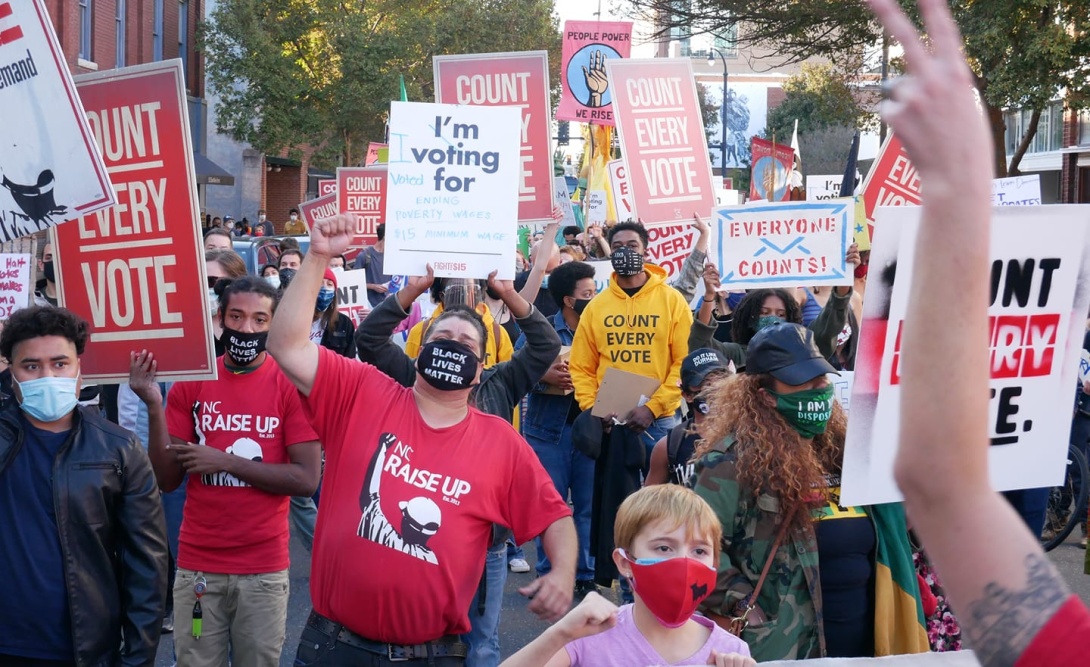Southern workers mobilize to ensure that every vote is counted

Hundreds of low-wage workers and activists rallied in Durham, North Carolina, on Wednesday to call for every vote to be counted. (Photo via Raise Up.)
Low-wage essential workers — overwhelmingly Black and Brown people and women — spent much of this year engaging in efforts to help get out the vote.
In the city of Durham, in the key swing state of North Carolina, for example, members of Raise Up/Fight For $15 and a Union engaged in a mass phone banking and texting campaign to reach fellow low-wage workers. They also leafletted neighborhoods to provide residents with information about early voting and to remind them that their vote is as essential as their work.
With the results of the presidential election still up in the air, the same worker activists who previously worked to turn out voters are now mobilizing to make sure that every vote counts.
The day after Election Day, as President Trump repeatedly called for a halt to the counting with his lead over former Vice President Joe Biden dwindling in key Electoral College states, protesters took to the streets in cities nationwide to demand that the counting continue. Among the groups involved in the march and rally held in Durham were the Fight For $15, the Farm Labor Organizing Committee, and National Domestic Workers Alliance.
"We can't claim to honor the dignity of every human being if we count the votes of some, but not of others," speaker Rabbi Salem Peace, the executive director of Carolina Jews for Justice, told the crowd of hundreds.
The rally was co-emceed by Sara Fearrington, a mother of six, Waffle House server, and a worker leader with the Fight For $15, and "Mama Cookie" Bradley, another Fight for $15 worker leader. Bradley reminded the crowd that essential workers had to work for low wages with no extra pay amid the COVID-19 pandemic for companies that did nothing to protect them from getting the virus.
"Our fight won't end with this election," Bradley said. "We have to keep building worker power because without worker power there is no power."
Fearrington voted for the first time this year, telling Facing South that she cast her ballot "to get rid of systemic racism, to get a $15 federal minimum wage, and to get union rights." She added, "If I don't vote then I am silencing myself."
The rally goers marched to the local Board of Elections, where speakers included D'Atra Jackson, the national director of Black Youth Project 100 (BYP), a member-based organization of young Black activists. During early voting and on Election Day, BYP members served as election defenders at sites across North Carolina to make sure voters had personal protective equipment as well as protection from voter intimidation. Jackson noted that this is the most important election of her lifetime, and that the moment to hold those in power accountable is now.
Local election boards across the state are continuing to count mail-in and provisional ballots. Many of the ballots arriving now are from members of the military stationed overseas. Under a settlement reached in a lawsuit brought by the N.C. Alliance for Retired Americans, a union-affiliated group, the North Carolina State Board of Elections agreed to keep counting ballots postmarked on or before Election Day through Nov. 12.
In addition to chanting "count every vote," the marchers also made sure to express their appreciation to the elections board staff, who are also essential workers.
"Thank you for taking time to recognize that every vote counts," Fearrington said.
Tags
Rebekah Barber
Rebekah is a research associate at the Institute for Southern Studies and writer for Facing South.
